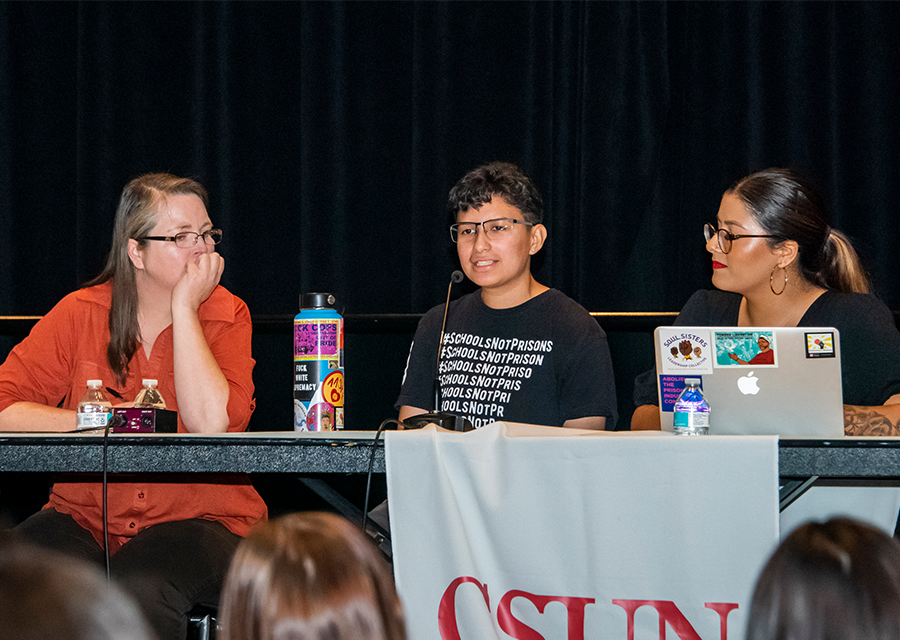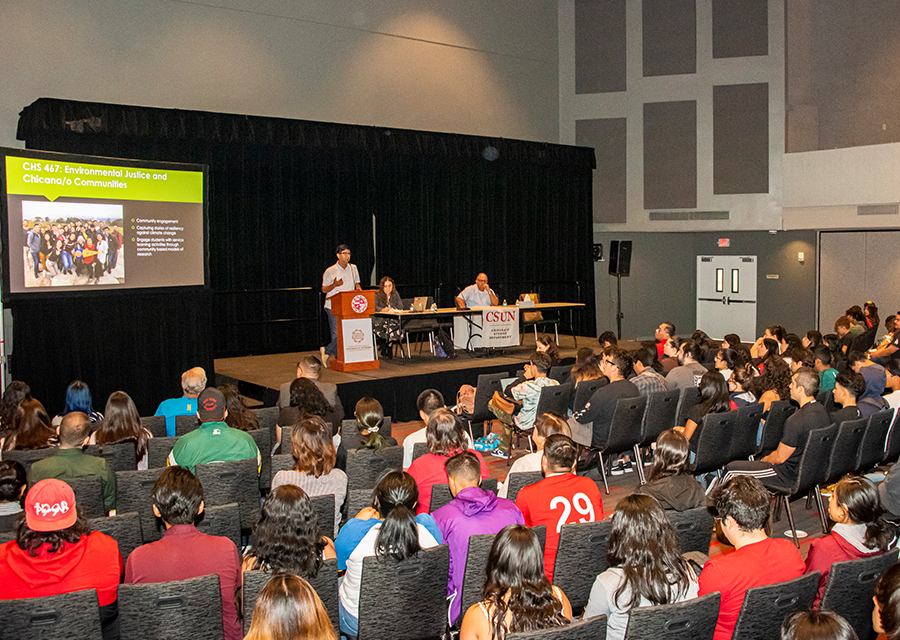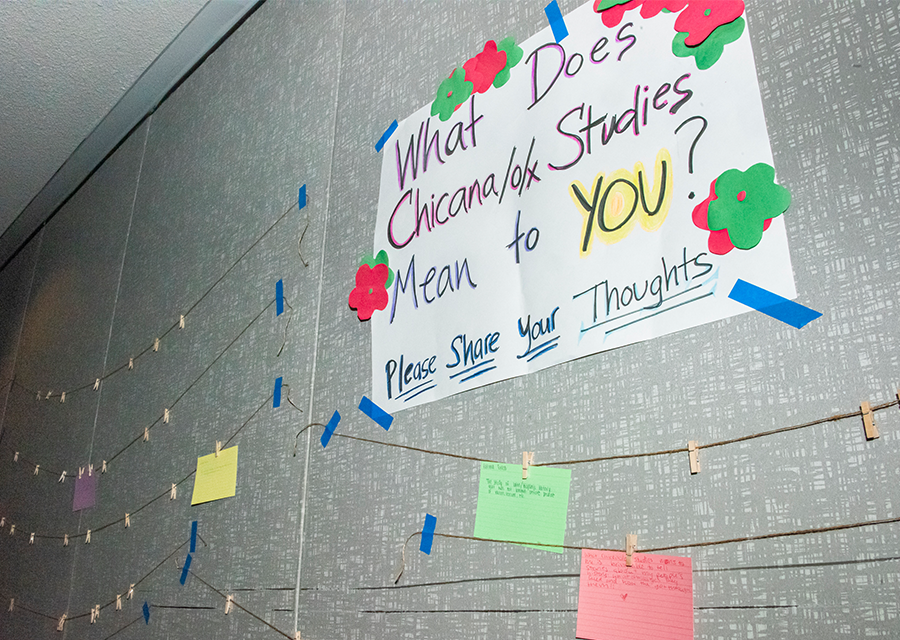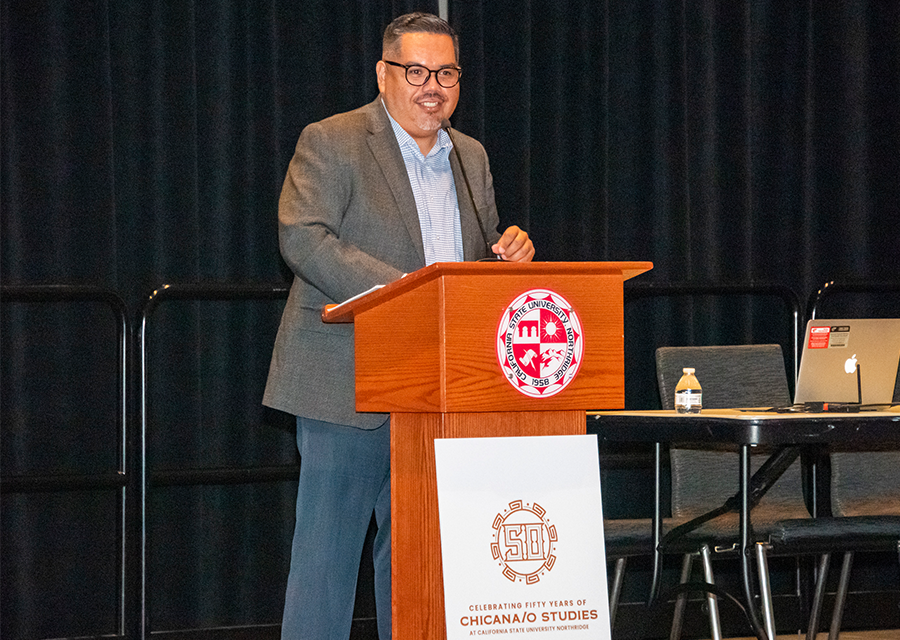CSUN’s Chicana/o Studies Symposium Echoes the Power of Research and Activism
American writer and civil rights activist Audre Lorde famously said, “The master’s tools will never dismantle the master’s house.” In other words, to demolish institutional oppression, minority groups such as the Chicana/o community need their own tools.
During the “Freedom and Voice: Celebrating Chicana/o Studies Faculty and Student Scholarship and Activism” symposium on Tuesday, Oct. 8, professors and students of CSUN’s Department of Chicana/o Studies showed the ways they’ve used research and activism to keep the voices of their community alive. The event was held in conjunction with the department’s 50th anniversary celebration.
After quoting Lorde in her opening remarks, professor Denise Sandoval ’95 (M.A. Chicana/o Studies), one of the event’s organizers, added, “The question is: How do we create new visions [for society] without using the master’s tools? This is our task as ethnic studies practitioners, to answer this question.”
Held in the University Student Union’s Northridge Center, the one-day symposium featured a keynote presentation on the history of Chicana/o studies, and a series of three panels that discussed various research projects conducted by faculty and students.
While many strides have been made, the struggle against the erasure of minority culture goes on — a recurring theme throughout the day.
In the keynote lecture, Cal Poly Pomona professor and former CSUN Chicana/o studies lecturer José Aguilar-Hernández talked about the concept of “ahistoricism,” or the narratives of the past that neglect historical accuracy in an attempt to erase minorities from history. This can be combated, he said, by collecting archives, records of oral traditions and copies of current work “to piece together our narratives.”
Aguilar-Hernández also discussed the fight to establish a Chicana/o studies department at his alma mater, UCLA, and the influence of activism at CSUN — members of CSUN’s MEChA group helped train the chapter at UCLA.
“It took a lot of struggle for these departments to exist,” Aguilar-Hernández said. “So, if you enroll [in Chicana/o studies classes], you’re validating the sweat, the labor, the love that had to happen in order for you to have access to this.”
The three panels that followed discussed research conducted by CSUN faculty and students. Each panel covered different approaches to how research and education can serve as powerful tools in battling ahistoricism.
Faculty led the first two panels — including one that emphasized the importance of sharing culture and literature in the form of cuentos (personal and historical stories) in integrating the Chicana/o voice in the narratives of greater society.
The final panel showcased faculty-student collaborations in research. Chicana/o studies associate professor Martha Escobar was joined by Rocio Rivera-Murillo ’19 (Chicana/o Studies and Sociology) and student Kelly De Leon, a senior double majoring in Chicana/o studies and Central American studies.
Escobar leads Rivera-Murillo, De Leon and two other students in the Carcerality Research Lab. Established in 2017, the lab studies the issues surrounding incarceration in California, specifically in the cases of Latina/o men and women sentenced to life in prison.
Rivera-Murillo and De Leon also talked about their activism on campus, especially their fight to keep the Section F (Comparative Cultural Studies/Gender, Race, Class, and Ethnicity Studies, and Foreign Languages) general education requirement — one that led many students to discover a passion for activism, they said — alive at CSUN.
“We engage in these mobilizations because we love our community, and we know how important ethnic studies was to us and our growth,” Rivera-Murillo said.
The panels only covered the tip of the iceberg, said professor Ana Sánchez-Muñoz, who co-organized the event with Sandoval.
“We could have certainly done a three-day conference,” Sánchez-Muñoz said, “and it wouldn’t even be enough to cover the breadth and the depth of the research accomplished by the faculty, and the work and activism of our amazing students.”
Students were invited to share what Chicana/o studies means to them by writing their thoughts on notecards and hanging them on lines along one of the walls of the Northridge Center.
One notecard read, “Chicana/o studies means my existence and … culture isn’t denied or ignored. It is acknowledged, appreciated and celebrated.”
CSUN Chicana/o studies chair Gabriel Gutiérrez said that the department’s 50th anniversary should be a time of celebrating its achievements, commemorating the efforts that led to today and continuing the fight to keep the community’s voice alive.
“We’re not just fighting for survival,” Gutiérrez said. “We’re fighting to grow [and] continue a legacy that was established by people that put their lives on the line so that we can have these conversations.”





 experience
experience